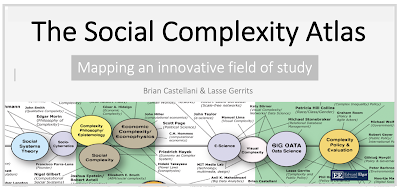On 28 and 29 Sept 2022, I had the opportunity to present on Co-producing
complex systems interventions for public health, as part of the Health CASCADE three-day workshop in
Amsterdam on co-creation.
It was a lot of fun and a really brilliant group of faculty and
students. Thanks again to Mai Chin A Paw, Kunshan Goh and the rest of the team
for organising the event, and to Sebastien Chastin
for the invite, and to everyone that
attended the event. I really enjoyed the discussion and I hope the ideas we discussed prove somewhat useful.
ABOUT HEALTH CASCADE
Before turning to my talk,
here is a bit more about Health CASCADE. It is a brilliant project and something
others should explore and promote! It is very much at the leading edge of
co-creation for health.
Health CASCADE is a Marie
Skłodowska Curie Innovative Training Networks project funded by the European
Union (H2020 MSCA ITN) (Project number 956501).
The aim of Health CASCADE is to
foster the next generation of highly trained research leaders to develop
evidence based guiding principles, novel tools, and new technologies to make
co-creation an effective tool to fight complex public health problems through a
European Joint Doctoral Programme.
Global health challenges confront
us all as individuals and communities – from obesity to pandemics, cancer to
dementia – magnified by climate change and increasing inequality. These
challenges are complex problems arising from multiple interconnected factors
and feedback loops, resistant to existing public health programmes. We need new
ideas and new approaches such as co-creation. By bringing together citizens,
academics, businesses, and civil organisations, the project aims to co-create
effective solutions to these complex problems.
OVERVIEW OF MY TWO-DAY
WORKSHOP
This two-day workshop explored the
value of integrating complexity science and co-production for developing
effective, evidence-based tools for addressing complex public health problems. (HERE IS THE
LINK to the PDF of my Presentation)
BACKGROUND
A complex systems approach has been
proposed as a powerful toolkit for addressing complex public health problems,
including the important role of place. In turn, co-creation has gained traction
for addressing the complexities of public health policy, practice, and
promotion, particularly around issues of inequality and inequity. While both
approaches offer vital strategies for addressing complexity in public health,
researchers are only beginning to explore their integration. Hence the purpose
of this workshop.
ORGANIZATION OF WORKSHOP
Day 1 provided a framework for
thinking about complexity in public health. To develop this framework, we began
with an introduction to the complexity sciences, including a map of its present-day
trajectories. From there we examined the current challenges the field faces. Particular
focus was given to the failure of most complexity science approaches –
particularly in terms of computational modelling – to effectively engage
stakeholders in the model building process, as well as the development or
evaluation of public health policies and practices. Given our public health
focus, the COVID-19 pandemic was used as our case study. We ended the day
highlighting some examples where progress has been made in integrating
complexity science and co-production, particularly participatory systems
mapping and case-based complexity – which attendees got a chance to explore.
Day 2 involved a series of break-out, small-group
discussions. The first explored, from both an epistemological and practical
level, which approaches to co-creation and complexity science might work best together
(or not), or critically inform or challenge one the other, including different
methods and tactics. The second session explored what sorts of methods or research
projects, or case studies participants could develop to advance the integration
of these two approaches to address complex public health problems.
HERE IS A KEY POINT – WHICH WE
SOUGHT TO ARRIVE AT, BUT STILL HAVE LOTS TO DO TO GET THERE. Co-creation emerged of late in response to the
limitations of science and policy and practice. Those same limitations are
often found in the complexity sciences. How can co-creation address those
similar limitations in the complexity sciences? In turn, given its focus on collective decision making,
co-creation struggles with complexity and systems thinking. How can the tools
of complexity science help? Be it systems mapping, computational modelling, or
network analysis?
HERE ARE SOME OF THE ADDITIONAL
LINKS from the Workshop
·
Here is an
open-access book by Barbrook-Johnson and Penn that is the gold standard on practical
guidelines for doing systems mapping, including participatory systems mapping.
·
Here
is an article by two CASCADE members (Lead author, Niamh Smith and
co-author, Sebastien Chastin),
using systems mapping and complex network analysis.
· Here is the
link to CECAN and its resources (complexity evaluation toolkit, tools for choosing appropriate evaluation methods) for engaging stakeholders and doing policy
evaluation from a complex systems perspective. CECAN stands for the Centre for
the Evaluation of Complexity Across the Nexus.
·
Here
is an open-access article by me and my colleagues that used participatory
systems mapping to develop a co-created policy agenda for air quality and brain
health and dementia.
· See
the community engagement work around co-creation and systems thinking being
done by Sharon Zivkovic
and colleagues.
-
Here is the link to
COMPLEX-IT, the software package my colleagues and I developed for helping evaluators,
civil servants, healthcare experts and public and third-sector











